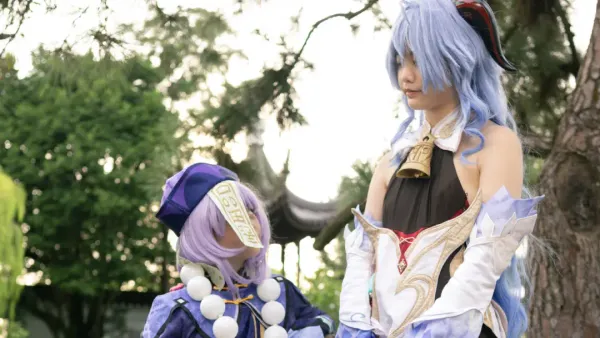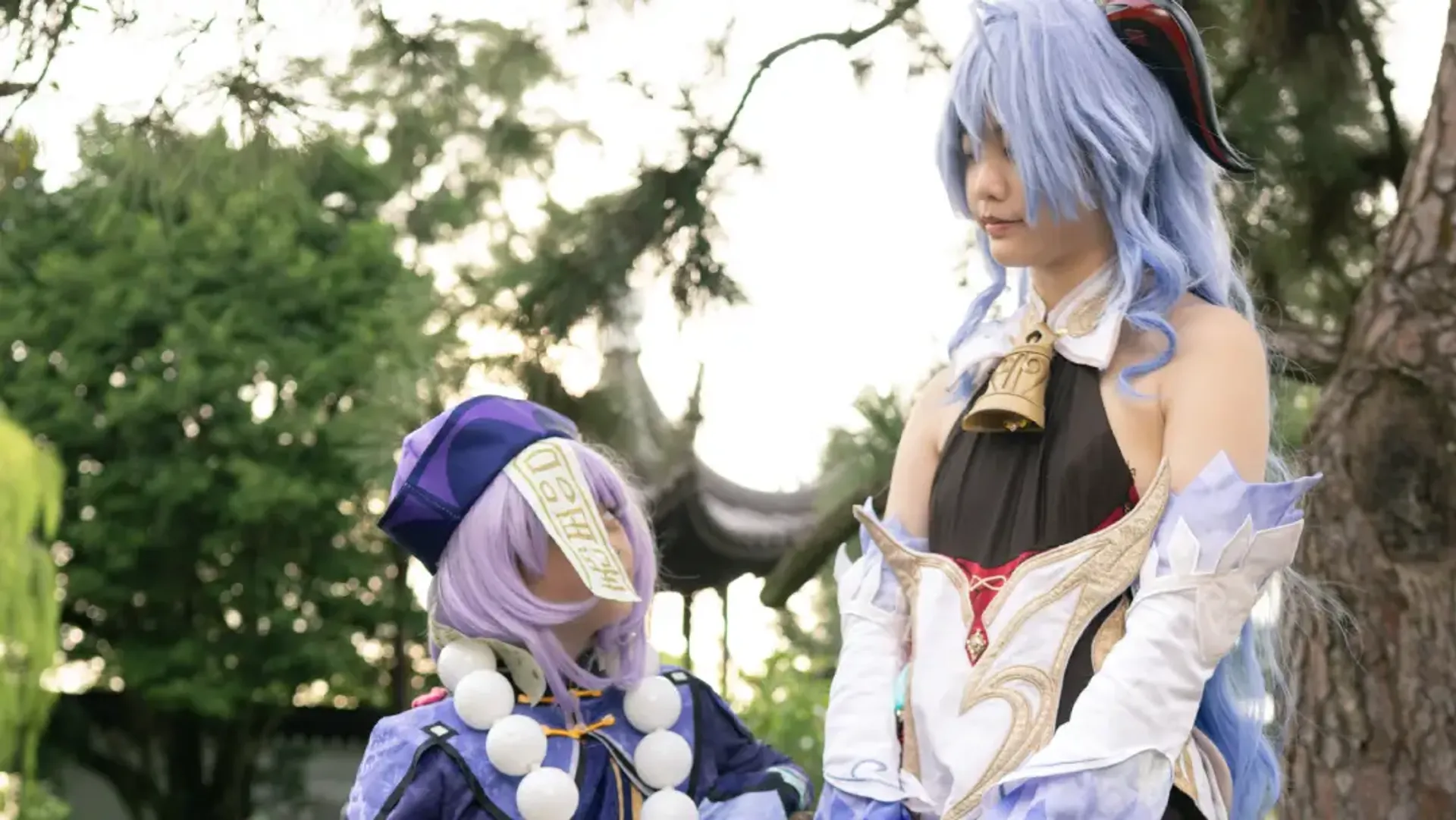On Empathetic Joy – The Lens Between Generations
Muditā – empathetic joy, delighting in others’ joy, and how I got it from shooting a pair of sisters and watching their parents’ reaction.
The Scene and Wonder
Premise
I recently had the opportunity to shoot the characters Ganyu and Qiqi from Genshin Impact. What made it somewhat special was that the models were a pair of sisters – the main person doing Ganyu roped in her young sister to cast as Qiqi. I marvelled at the novelty that I could finally shoot a canonically child character with a real child and not like a 170cm+ adult pretending to be one. Naturally, “older sister takes care of much younger sister” would become one of the motifs of the shoot, but the insights that I gained from the shoot actually came not from the children, but from the parents who came along to keep a cautious eye on them.
Scene
On a cloudy but still hot afternoon, I met the children and their parents at the Chinese Gardens adjacent to the Jurong Lake Gardens. The atmosphere was tense and chilly at first, understandably so because I had to gain the parents’ trust and warm up the children I was shooting.
I noticed the interactions and dynamics between the children and parents. There was slight tension as if the children were ever so slightly annoyed that their parents came with them for the shoot and had to supervise them in doing their hobby (that the parents might not necessarily have the most favourable impression of). When we walked between scene locations, the parents would walk several paces behind, dutifully carrying the extra props and their other belongings. At locations, when I was busy posing the children, the parents watched very eagerly from a distance, careful not to upset their teenage children. When they sometimes gather the courage to try and participate in the shoot, either by suggesting poses or helping to adjust the costumes, they were usually met with a slight abrasion from the children – think a teenage girl swatting the dad’s hand away when the dad tries to wipe sweat off the girl’s face or adjust a part of the costume that had come loose. It’s completely normal for teenagers to be adverse to unsolicited physical contact from their parents at that age; I was once a teenager, too, so I understood without passing judgment.
Wonder
Despite the slight tension between the teenage children and the parents, I noticed both groups being content with themselves. The older sister was used to this, but the younger sister had never shot before, let alone put on a cosplay. Fitting of a zombie, the younger sister did not show much facial expression when I showed her the photos, but I could tell she started to enjoy the process too when she became more proactive and energetic when adjusting poses or switching scenes. The sisters were doing their hobby together and both enjoyed it, so you could see and hear the occasional laugh and banter between them.
For the parents? Even though they were mostly met with cold “give me my own space” reactions from their teenage daughters, I could tell that they were starting to enjoy it too. From afar, the Dad would be sneaking his own photos of the kids (or the scene) with his own smartphone. Mom looked both pleased and surprised when I showed them the photos I took of their kids, perhaps never having seen their kids photographed like this.
But beyond that, I noticed a different kind of joy. The calm and content look when the dad was simply looking at his kids having fun, despite not being a direct actor in their play. I started to wonder how and why parents feel content just watching their kids enjoy themselves.
Then it hit me. Despite not being the one in cosplay, I, too, had felt a simple joy when I saw the sisters enjoying themselves. And on a deeper level, despite not owning those kids, I felt joy too when I saw the parents feel content watching their own kids have their own joy. What a chain reaction.
This was delighting in other people’s well-being: Muditā, or empathetic joy.
What Is Joy When It’s Not Our Own?
Why did I feel happy at all?
Nothing in that moment was “mine”. The parents are not mine, the children are not mine. Perhaps I had some ownership over the photos, but I was not feeling the majority of the joy from the photos themselves. If I were to be harsh on myself, my artistic skill and photography technique felt average that day, and there weren’t photos that I was particularly proud of that I would put on this website.
Yet, the delight I felt when I saw their joy. Was my joy borrowed? Reflected? Contagious? It went from the children, to the parents, and finally to me.
Perhaps we don’t need to possess something to be moved by it.
I neither owned the parents nor their children. Yet, I was moved and delighted by the joy that they felt, as the parents were when they saw their children having fun on their own despite not directly participating.
It differed from pride – the joy that we feel when our work or our people succeed. As I wrote earlier, I wasn’t particularly proud of the photos themselves from this shoot. But there was something else I was proud of, something that I was directly responsible for.
The Role of the Photographer
Photography, as a technique, is simply recording light into images and capturing the truth. But as a practice, it could enable many more things.
I did not merely record what just happened. On the contrary, all the photos I took are staged; the “real things” that happened naturally, such as the interactions between the sisters and the parents off-camera, were not recorded as photos, just left as memories in each of our minds.
But my presence changed what could have happened. With my craft, I first opened up the children and lifted their self-esteem, then gained the parents’ trust, and finally let the parents feel their own joy from watching their children’s joy.
I’ve long been aware of the concept of the affirming lens, of how my art was a vital tool in lifting the self-esteem of others when they see themselves reflected in my work. But this was probably the first time I was shown how creating joy in the photographic subjects could, in turn, induce joy in the people around them – in this case, the parents.
I’ve probably allowed the parents to see their children being good at what they’re good at and enjoying what they enjoy doing. In addition to the material aspect of leaving behind photos for them to look at after the shoot, I probably also gave them the chance for the parents to spend quality time with the children on an unorthodox family outing disguised as a photoshoot. After all, we did quite explore quite a bit of the Chinese Gardens.
The role of the photographer here was no longer just about taking photos. If people still want to define a photographer as someone who takes photos and leaves, then I probably would not wish to call myself one anymore.
The Absence of my own Experience
The joy that I witnessed was not something that I had the privilege of experiencing myself.
I’ve never been the carefree child, unburdened enough to play dress-up without self-consciousness. Neither do I have the privilege of being a parent, secure and proud enough to watch my non-existent children flourish.
I stood between worlds. I was neither as old as the parents nor as young as the children, so I couldn’t stand in their shoes.
But empathetic joy doesn’t require us to relate, only witness. The other inhabitants of the world live very different lives from us, and it would be impossible to experience the same joys as the people we meet. If we had to relate to feel empathetic joy, it would be very difficult to feel any joy for anyone.
Without the capability to appreciate empathetic joy, I might feel jealousy or resentment from comparison.
”Look at those kids being able to enjoy their childhood without burdens – whereas I was just told to study and grind TYS"
"Look at Dad having found their own people to pour love into and nurture – whereas I’m lonesome and have to beg for it”
In that moment, empathetic joy felt liberating, as I was no longer seeking out and weighing the imperfections and inadequacies in my life. I found my empathy strongest when I stood at the edge of something I had never lived, not at a place where I could “relate to”.
Conclusion
This shoot had deeply increased my awareness of the concept of Muditā, or empathetic joy. It is a virtue that asks us to transcend self-reference – to love beauty without trying to possess it, to affirm happiness without needing to share in it.
What other ways can cosplay and photography embody this concept? Do you feel happy for others when they cosplayed the same character as you, and their social media posts get the attention you don’t, or do you feel jealousy? When I see other photographers also make impressive works with the people I had worked with before, do I feel happy for them, or do I feel an envious possessiveness? Can we feel joy from the phenomena that you do not have a direct participation or ownership in? You don’t own the character, nor do I own the model, yet we can still feel the empathetic joy.
Empathetic joy is a brief respite from the hunger of possession. Through my art, I hope to continue experiencing and providing said respite – and perhaps, somewhere along the way, you may find your own moments of such quiet release.

